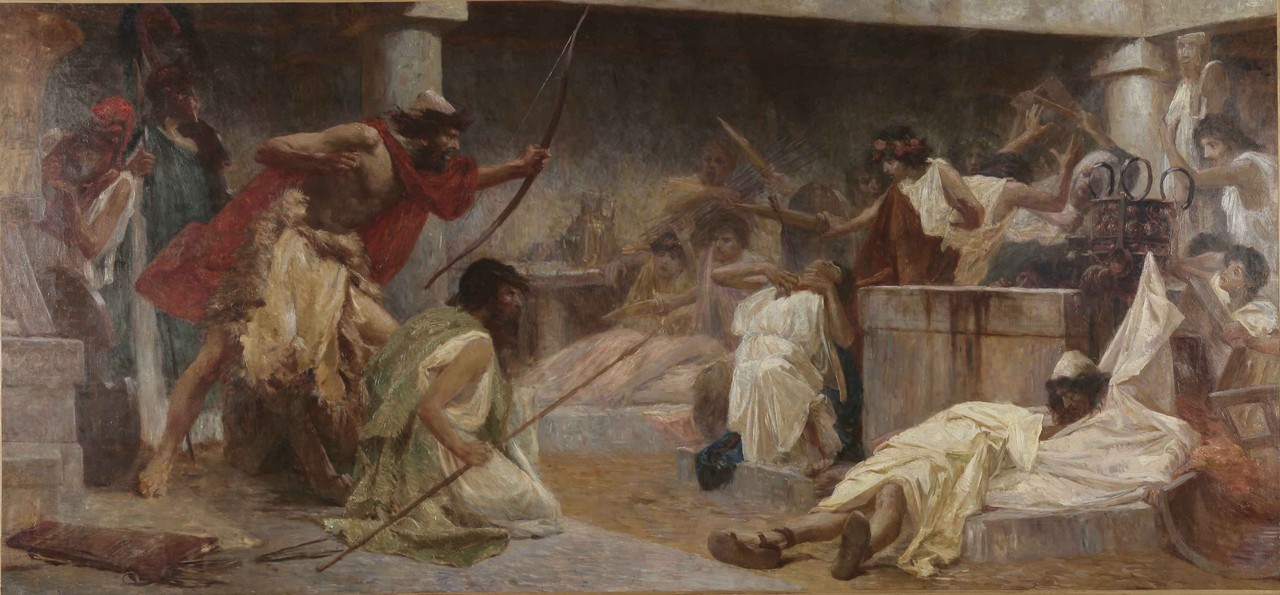The king, disguised as a beggar, sits in the great hall of his house. He has been gone for twenty years. He is handling a mighty bow, apparently for a game. Who can string that bow and shoot an arrow straight through a row of ax-handles, hitting the mark exactly?
No one else in that house has the strength or the skill. The house has been infested with suitors for his wife’s hand in marriage, 108 of them. They have been drinking his wines, devouring his herds, corrupting his housemaids, and plotting the murder of his son. They have spent the last day sometimes dealing bread and meat to the beggar, and sometimes abusing him, cursing him, throwing things at him, and threatening to ship him off to a barbarian who castrates his prisoners. It’s not going to be a good day for the suitors.
Odysseus strings the bow in one graceful and powerful movement, then strikes the string with his thumb, making it sing like a bird. It is the perfect gesture. He utters a prayer to the archer god, Apollo, and sends an arrow flying – straight through the targets, a perfect shot. The suitors are stunned, but they remain blind to their fate, roaring with laughter and song. They continue to guzzle.
Then Odysseus says, “I’ve another arrow here, and I pray that Apollo will assist me, for I aim at a target never struck before.” He bends that bow and shoots the feathered death through the throat of the ringleader, Antinous, right as he raises a cup of wine to his lips. Perfect target, perfect moment.
Later that afternoon, when the suitors lie strewn in death, Odysseus comes upon a man cowering in a corner. It is the blind singer, Phemius. He kneels before the king and catches him by the knees, pleading for his life, because he had been compelled to sing for the suitors, though he hated their evil ways.
“Spare the good singer, father,” says Telemachus, son of Odysseus. “He tells the truth.”
Phemius adopts the pose of the supplicant, literally: he falls to his knees. When we “supplicate” our Lord, we kneel. It’s as natural as smiling, or taking someone by the hand. We make ourselves small. We acknowledge our powerlessness. “Unless you accept the kingdom of God as a little child,” says Jesus, “you shall not enter.” The lintel to that kingdom is low. We must be emptied of ourselves to be filled with God.

The language of our bodies is not wholly arbitrary. We cannot say, “We’ll stand on one foot and hold a forefinger to the nose, and that will signify that we long for the fragrance of grace.” No one will understand that. We ourselves will not believe it. We cannot say, “We will adore God by slouching in the pew, arms and legs spread-eagled.” It can’t work.
We cannot say, “We will emphasize the holiness of the Eucharist we are about to receive, by milling about the aisles to pass small talk with friends.” Our bodies will contradict our purported intention. The “emphasis” will be at best notional. We will not feel it in our pulses.
In the diocese where we spend our summers, the faithful at Mass have been instructed to kneel only during the first part of the consecration. When they return from Communion, they’re to remain standing until every communicant is back in his seat. Then they invariably sit down. So there’s no kneeling in silent prayer. That standing is supposed to stress the “community” of believers.
I’ve been struggling to put into words an insight I’ve derived from Father Aidan Nichols’ Looking at the Liturgy. What kind of priest or prelate thought it was good to cover paintings of the saints with whitewash? To remove great altars? To throw statues into the dump? To reduce communion rails to rubble? To swear off the cassock? To expunge hieratic language? To send ancient prayers written by Ambrose and Aquinas down the memory hole? To rip out pews decorated with flowers and birds, carved by the men who built the church?
It is all of a piece. Let’s give the wreckers the benefit of the doubt. Grant that they actually believed that blank walls do not a warehouse make. Grant that the bishops of Canada believe that people, many of them aged, standing around and watching other people standing around, will think of community, and not the blessed moment when they finally get to sit down. What can I conclude, other than they have been like color-blind people before a Monet, or tone-deaf people at a Bach chorale, or boors wearing sneakers to a wedding, or klutzes in a china shop?
These are natural defects. It’s no sin to be color-blind. But is that all? Over-schooled people, long sheltered from the physical necessities of life, from plowing, sowing, digging, sawing, stitching, bleaching, ironing, mowing – they are most prone to lifeless abstractions, and most dismissive of the bodily gestures that people who work with hands and shoulders and backs understand. That whole scene in Homer’s poem, each action in just the right place, would be for them one arbitrary thing after another.
The suitors were wicked, but they still liked good food and wine and song. They left Odysseus’ house standing. Our ruiners may have been saints or devils, but as far as our churches and liturgies are concerned, we’d have done better with drunken sailors.
It’s a fight we still must fight. It’s easy to whitewash; hard to restore what was whitewashed away. It is easy to shred prayers; hard to return them to their place of honor. It is easy to stand, as in line at the delicatessen; hard to learn again the bodily habits of humility. One age can ruin what centuries built. It will take more than one age to build again on the ruins.
*Image: Odysseus Slays the Suitors by Bela Čikoš Sesija, c. 1920














